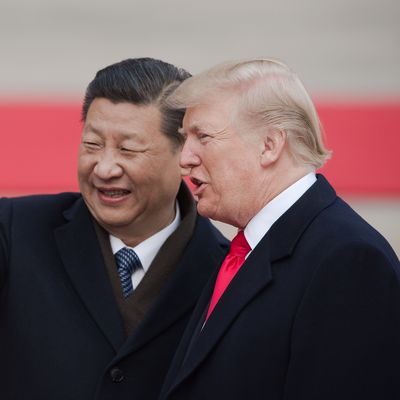
Back in August, the Trump administration officially declared China a currency manipulator. Today, it is expected to reverse that decision. So I asked Patrick Chovanec, the chief strategist at Silvercrest Asset Management and a former economics professor at Tsinghua University in Beijing, whether China’s currency behavior has changed at all since August.
“No,” he said.
By the usual definition of currency manipulation — acting to artificially change the value of your currency to gain an advantage in global trade — China has not been a currency manipulator since about 2014. China still cheats on trade in other ways. But the narrative that China keeps the yuan artificially cheap to make its exports cheap has far outlasted China’s actual practice of doing so. In fact, a key reason Trump was upset with China this summer was because China failed to intervene aggressively enough to push its currency up in value at a time when economic factors were dragging it down.
Perversely, it’s possible the Trump administration’s “manipulator” designation made the Chinese more inclined to manipulate their currency — in the direction Trump desires, which is to say, keeping it high so Chinese exports don’t get too cheap. But Chovanec notes the Chinese were already wary about letting their currency fall, and that its not clear they’ve needed to take many affirmative steps to keep it stable since the initial dip in the summer.
But “currency manipulator,” like “neoliberalism” and “Cobb salad,” is one of those terms that doesn’t really mean anything anymore. Trump has used it as a term of abuse to say to China that we’re mad at them because of trade. And now that Trump wishes to signal progress on trade with China, it’s time to withdraw the term of abuse.
The essentially symbolic nature of this action fits with the essentially symbolic nature of the Phase One trade deal as a whole. While we have agreed to modestly reduce our tariff package on Chinese goods, the most important implication of the Phase One announcement last month was the détente — that we would not be raising tariffs more, for now. China has made a similarly symbolic commitment to buy some vaguely increased quantity of American agricultural goods, and to work toward agreements in areas of concern to the U.S. like intellectual property. And both countries are expected to agree not to artificially weaken their currencies for trade purposes, which is not terribly difficult, because neither we nor the Chinese currently do that.
It’s likely our trade relations with China will remain essentially on pause through the election — President Trump seems worried about the economic headwinds trade escalation could create in the short term, and the Chinese economy is more troubled than ours and will need the respite. Many issues will remain to be addressed in Phase Two, by whoever is president in 2021. But currency manipulation will not be one of the key ones.





























